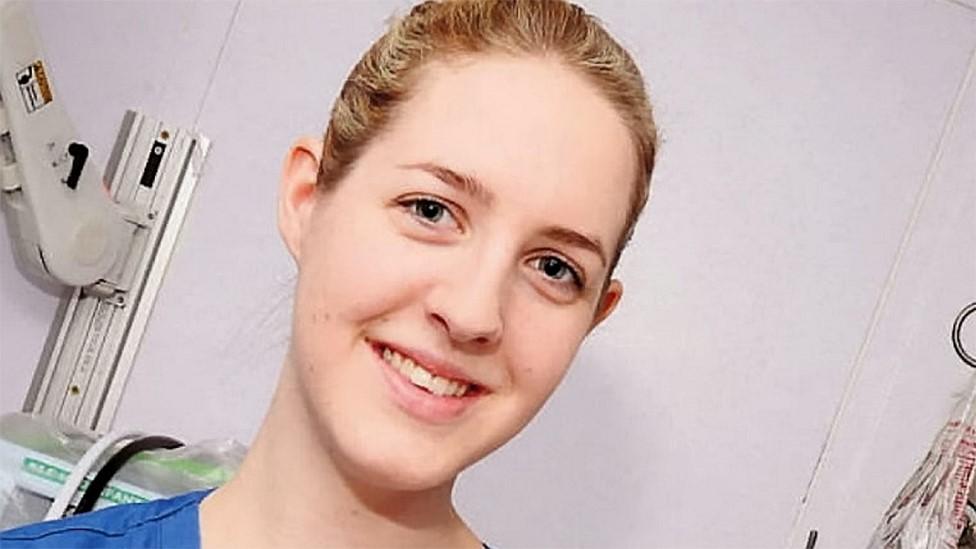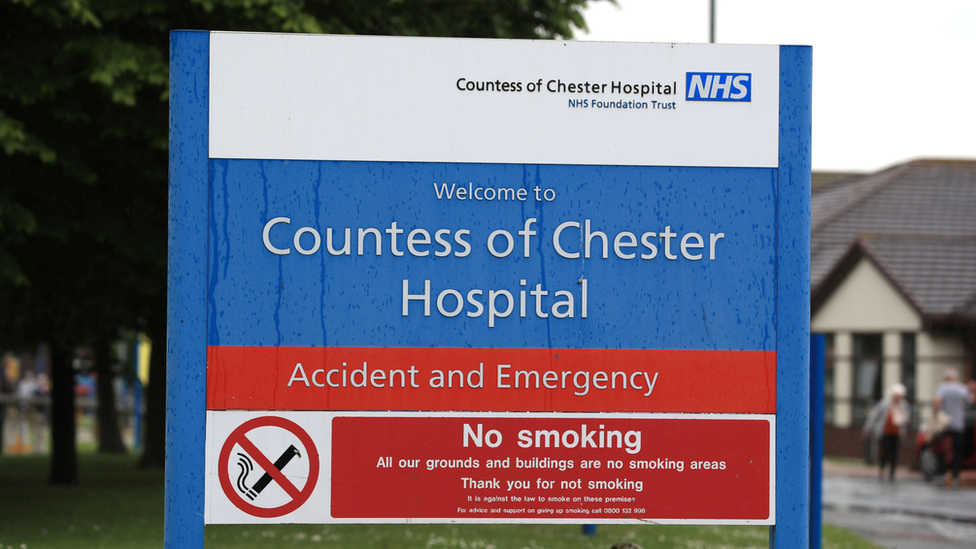Lucy Letby: Doctor rejects chest drain claim, trial told
- Published

Lucy Letby is accused of murdering seven babies and trying to kill 10 others
A senior doctor has rejected claims his insertion of a chest drain contributed to a baby's cardiac arrest, Lucy Letby's murder trial has heard.
Manchester Crown Court heard the girl, referred to as Child H, suffered two "profound" collapses at the Countess of Chester Hospital in September 2015.
The prosecution allege Ms Letby, 32, was responsible for the incidents.
Ms Letby denies murdering seven babies and attempting to murder 10 others between 2015 and 2016.
Jurors heard Child H, who was born six weeks premature, needed treatment for a pneumothorax, which occurs when air leaks into the space between the lung and chest wall.
On the evening of 24 September 2015, Dr Alison Ventress performed a procedure called a thoracocentesis, which involves inserting a needle into the chest to withdraw air, on Child H.
The registrar then inserted a pigtail chest drain to prevent any accumulation of air within the chest.
However, in the early hours of 25 September more air had accumulated and Dr Ventress sought assistance from consultant paediatrician Dr Ravi Jayaram.
Dr Jayaram arrived on the neonatal unit shortly before 02:00 BST and took the decision to insert a second drain.

Child H was being cared for on the neonatal ward at Countess of Chester Hospital
Citing an X-ray of Child H's chest, Ms Letby's defence counsel Ben Myers KC put it to Dr Jayaram that he inserted the drain in the "wrong place".
Mr Myers told the court according to medical best practice, a drain should be inserted in the fifth intercostal space, which is around the under-arm area.
Dr Jayaram agreed the drain he inserted was "clearly not" in this area, but said it was still in a "good position" and "was working".
Mr Myers said the drain was in a "sub-optimal" position and "risked interference" with the heart.
Dr Jayaram rejected this, adding he had "never" witnessed a drain interfere with the heart in the way suggested.
"It wasn't in the wrong place," he said.
"You very much focus on process, we have to look at outcome which was the crucial thing at the time. This made (Child H) more stable."
Mr Myers reminded the court that in the hours and days following, Child H suffered a number of desaturations - two of which were "profound" and led to Child H needing CPR.
Dr John Gibbs, who was a consultant paediatrician at the Countess of Chester in 2015, attended Child H's first serious collapse in the early hours of 26 September.
The infant needed three doses of adrenaline as medics battled for 20 minutes to resuscitate her.
Dr Gibbs' notes from the time, shown to court, stated the reason for her collapse was "unclear".
The consultant sketched out possible reasons for the collapse in his notes and suggested it could be a "result of trauma from chest drains against the heart", but he told the court subsequent ultrasounds "showed that had not happened".
Asked by the prosecution whether such a drain could cause any internal issues, Dr Gibbs said: "Not that I'm aware of. I wouldn't expect it to cause any trauma or damage to (Child H) at all."
Child H was discharged from hospital on 9 October after she continued to improve and in a statement, her mother said her daughter had been "absolutely fine and healthy since".
The trial continues.

Why not follow BBC North West on Facebook, external, Twitter, external and Instagram, external? You can also send story ideas to northwest.newsonline@bbc.co.uk, external
Related topics
- Published19 January 2023

- Published18 January 2023

- Published15 December 2022

- Published14 December 2022

- Published13 December 2022
